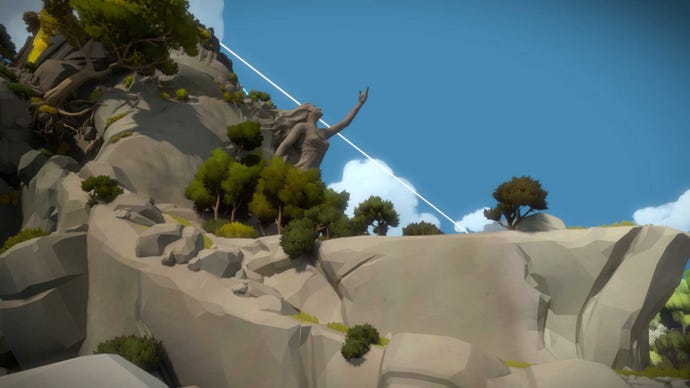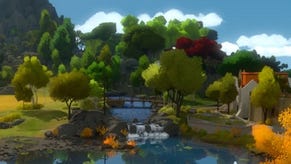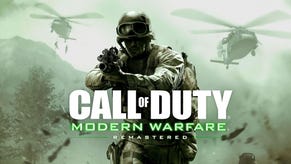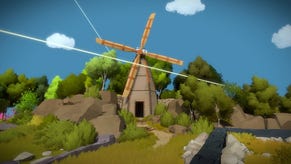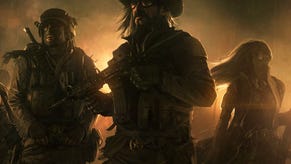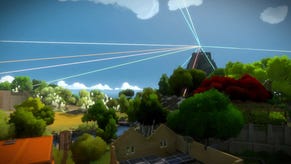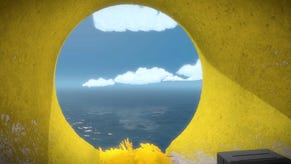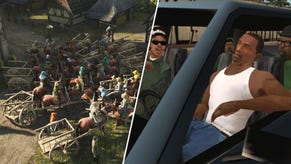Who is The Witness for? We asked Jonathan Blow
The Witness can be genuinely hard, which inspires us to ask: who is this game for? Jonathan Blow replies.
"I do have some kind of ideal player in mind when I design games. That player is inquisitive and likes to be treated as an intelligent person."
How about The Witness then? It's a corker. It has a lot of selling points, not the least of which is its difficulty: the polished shine on the graphics belies an indie heart that refuses to bow to accessibility in the name of appealing to the broadest possible audience.
The Witness, with its dearth of explanatory materials and exponential learning curve, is definitely not designed for a mass audience. You can't see Jonathan Blow sitting down with marketers and using words like "target demographic".
"My design processes are driven by my own internal compass rather than trying to satisfy some goal imposed externally," Blow told VG247.
"But I do have some kind of ideal player in mind when I design games. That player is inquisitive and likes to be treated as an intelligent person."
Many games don't treat their players as intelligent people; they're too busy treating them as the lowest common denominator. Publishers seem to be so afraid someone will hit a difficulty wall that they focus test games until all the rough edges - and therefore, the texture - have been polished right off.
Thekla Inc. did not run The Witness through focus testing to make sure nobody got stuck. It did show the game around during development, to make sure it works the way it's supposed to work - "a reality check, to make sure that our ideas about how the game operates are really true," said Blow - but not in the name of accessibility.
"I don't really test games in that way. Most testing that we do is just about making sure the game works functionally," Blow said.
"I think that the game industry generally is too reactionary about what players think about their games, and gets into this habit of smoothing things down with sandpaper any time a player doesn't like something, so that eventually all that is left is a kind-of-bland smooth surface."
One of the things that makes The Witness so special is that it still manages to provide even a slightly determined player with plenty of content. The full game has something like 600 puzzles, some of which may not be solved for a very long time (although it does not do to underestimate the Internet), and you will be stumped by one of these - at least temporarily.
"The game industry gets into this habit of smoothing things down with sandpaper any time a player doesn't like something, so that eventually all that is left is a kind-of-bland smooth surface."
When this happens, you can just walk away and do something else - not just literally, taking a break from the game, but within the world of The Witness itself. This is entirely by design.
"The game is extremely non-linear, which means that if you get stuck somewhere, there are usually several places you could go nearby, just 30 seconds' walk away because the world is built to be compact, where you can do totally different puzzles," Blow said.
"A minimal completion of the game doesn't require solving anything; it just requires a certain amount of solving to be done, but you can choose which parts of the game you solve."
"Also, it may be that in exploring other areas, the player encounters some puzzle that reminds her of something she was stuck on and gives her new ideas to try. We've built these kinds of opportunities into the game in many places," Blow said.
This isn't hot air; I've already personally encountered dozens of examples. One of the first areas the player is likely to visit outside the starting zone contains a puzzle-locked door that seems impenetrable, only to yield its secrets within seconds of conquering two nearby sets of "tutorial" boards. I've been baffled by other locks and found their solutions on the complete other side of the island.
There are people currently playing The Witness who just aren't getting on with it at all. They solve puzzles, but don't know why, and can't figure it out - or they don't solve puzzles, and feel frustrated. Then they get angry.
The thing is, everybody who plays The Witness feels the same - at least now and then. The people who love The Witness are those who know this feeling is temporary, who know from experience that with enough patience and attention to detail, they'll figure out what's going on - and come out the other side stronger and better-prepared for whatever nefarious tricks Blow and Thekla spring on them next.
There's a tendency among a certain type of gamer to call out difficult games as bad design; there are plenty of people who genuinely believe that From Software's games are rubbish, and everyone who likes them is a masochistic fool.
But The Witness is a puzzle game. It's explicit purpose is to puzzle you. You are meant to be puzzled. That's the point. It's like a book of puzzles; those flimsy things you get at newsagencies, stacked with sudoku or crosswords or those logic grid things that make me nervous.
You don't buy a book of puzzles because you expect to fill the pages in one-handed while typing an essay with the other; you buy them to challenge your brain in interesting ways, because it is fun. You don't expect to be able to solve every single one immediately - or maybe ever. If that doesn't sound like a good time to you, then you're not the audience Blow and Thekla are looking for. And that's okay. It doesn't make you stupid - but it also doesn't make The Witness bad.
The Witness isn't for everyone, but video gaming is a very broad medium. We need to accept that we have room for games that aren't for everyone.
